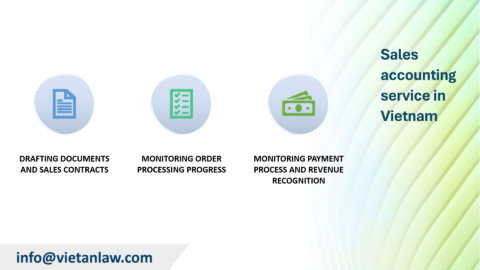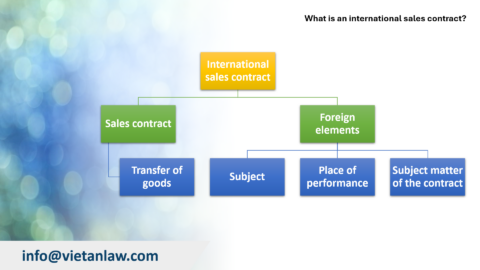Entering into a credit contract is a process that includes many stages: (1) Loan request and credit dossier preparation, (2) Credit profile appraisal, (3) Loan decision, (4) Negotiate contract terms and sign contracts. To prevent legal risks during these stages, Viet An Law advises on the common errors during the process of concluding and performing credit contracts.
The stage of preparing and appraising information documents is the first stage, which is extremely important for businesses. Credit records show the overall relationship between the business and the bank, proving the business’s eligibility for a loan. The completeness and accuracy of the credit records and the results of the appraisal procedure (which is the appraisal of the business’s loan conditions) are the basis for the business to be able to get a loan from the bank.
Based on the above credit dossier, the bank can collect all the necessary information about the past and present of the business and can determine the business’s ability to refund the loan capital for a certain period of time. In case of necessity, the bank will require the business to add additional security assets to limit risks.
Based on the results of credit records appraisal, evaluate the feasibility and effectiveness of production, business, service projects, and life and repayment ability of businesses, banks, and credit institutions must make decisions and notify businesses of their lending decisions. In case of deciding not to lend, the credit institution must clearly state the reason for refusing to lend.
A credit institution’s loan decision does not mean that a credit contract has been signed. The above decision is only the basis for negotiating and agreeing on contract terms and signing a credit contract. In principle, a credit contract takes effect from the time the representatives of the two parties participating in the contractual relationship (the credit institution and the enterprise) sign the contract document and the parties also do not have an agreement on the beginning of the contract’s validity.
Businesses should consider thoroughly that the person signing the contract must have the full right to sign, which can be a legal representative or an authorized representative. This representative must also have full civil capacity.
Considering the subject status of the borrower is an important issue, it directly affects the validity of the credit contract. In fact, if a credit institution ignores this issue and does not properly determine the subject’s status (especially in cases where the borrower is an organization or business), it will lead to signing a credit contract with the non-eligible subject. The contract was declared invalid, causing heavy losses to credit institutions.
It is very important to consider the subject status of the borrower – the business. This is the basis for judges and arbitrators to consider the validity of the credit contract. Wrongly determining the status of the borrower leads to invalid contracts, and credit institutions cannot recover interest, causing heavy losses to credit institutions.
The loan amount depends entirely on the agreement of the parties. In a credit contract, the agreement between the credit institution and the borrower regarding the loan amount is limited by legal regulations. The loan amount is formed on the basis of the credit institution’s loan level and the borrower’s consent to that loan decision (Articles 13 – 18 of the Loan Regulations). To decide on loan level for borrower, credit institutions must rely on the following basis:
In special cases, credit institutions are only allowed to lend in excess of the loan limit as prescribed above when permitted by the Prime Minister for each specific case. In addition, to ensure objectivity and transparency in lending activities and avoid profiteering from loan activities, the laws of most countries around the world limit lending to low levels. more for some specific subjects. According to Article 78 of the Law on Credit Institutions 2010: Credit institutions are not allowed to lend more than 15% of the credit institution’s equity capital to the following subjects:
For loans to invest in securities: investing and trading in securities always has potential risks, especially in the stock market in Vietnam, where investors are mainly non-professional investors, which increases risks in the stock market. Investors’ risks directly affect the risk of banks not being able to recover capital, causing the banking system to collapse. Therefore, in order to limit the amount of bank capital being poured into the stock market and control credit quality, the Governor of the State Bank issued Decision No. 03/2008/QD–NHNN on the organization of credit loans, discounts on valuable papers for investing and trading in securities. Accordingly, the total loan balance, discounting valuable papers for securities investment and trading does not exceed 20% of the credit institution’s charter capital. Credit institutions that lend and discount valuable papers for investment and securities trading must ensure a safety ratio in the operations of credit institutions according to the regulations of the State Bank of Vietnam, with the ratio of bad debt to total credit balance below 5%. Therefore, lending and discounting valuable papers for securities investment by credit institutions are controlled by the charter capital of the credit institutions. Therefore, when businesses borrow capital for the purpose of investing in securities, they need to consider the charter capital of the credit institution and the credits in this field that have been granted to clients. The larger the charter capital, the higher the loan level.
Currently, there are security measures such as pledging, mortgaging with the borrower’s assets or with the assets of a third party, deposit, escrow, and trust. Among them, pledging and mortgaging are commonly applied measures. Banks often want businesses to borrow capital using their own legally owned assets to secure the business’s loan at the bank.
These assets must satisfy certain conditions such as:
Among the conditions for secured assets, it is especially important to note that the customer must have legal ownership of that asset.
When considering the legal validity of a credit contract, in addition to considering factors related to the legal validity of the contract in general, it is necessary to pay attention to the regulations specifically applicable to credit contracts. A credit contract is declared invalid when the signed contract does not satisfy the conditions for validity of the contract such as subject capacity, voluntary conditions, purposes, and the content of the contract is not contrary to law and social ethics.
One of the reasons why a credit contract is invalid is the lack of authority signing person.
In principle, the legal representative of the organization is the person with the authority to sign the credit contract. The legal representative can be a legal representative or an authorized representative. Authorization must be done before entering into a contract. However, to protect the interests of the parties and minimize the possibility of declaring a contract invalid due to the person signing without proper authority, the provisions on authorization in current law are also flexible. Accordingly, authorization can be done before or after signing the contract and can be in writing or in a certain form.
According to Article 143 of the Civil Code 2015: “Civil transactions established and performed by a representative beyond the scope of representation do not give rise to the rights and obligations of the represented person with respect to the transaction performed beyond the scope of representation, except in cases where the represented person agrees, knows but does not object within a reasonable period of time or the represented person is at fault so that the person who has made the transaction does not know or cannot know about the fact that the person has confirmed the transaction, establishing and performing civil transactions with yourself beyond the scope of representation”.
Therefore, acceptance by a competent person after the contract has been concluded does not make the contract invalid. This is completely consistent with the spirit of Resolution 04/2003/NQ–HDTP of the previous Council of Judges of the Supreme People’s Court guiding a number of legal provisions in resolving economic cases. According to Resolution 04/2003/NQ–HDTP, a person with authority to know and not object is considered to be in one of the following cases:
In addition, the credit contract can be declared completely invalid when the borrower is a subject prohibited from lending or in cases where the type of loan is prohibited. Article 126 of the Law on Credit Institutions 2010 stipulates:
Credit institutions and foreign bank branches are not allowed to lend to the following subjects:
The above regulations do not apply to people’s credit funds and large-scale financial institutions.
In addition, Article 127 of the Law on Credit Institutions 2010 also does not allow credit institutions and foreign bank branches to grant unsecured credit or grant credit with preferential conditions to the following subjects:
Thus, if a credit institution lends to the subjects specified in Clause 1, Article 126 and grants unsecured credit or with preferential conditions to the subjects specified in Clause 1, Article 127 of the Law on credit institutions, that credit contract will be declared completely invalid.
In addition, the credit contract can also be declared completely invalid when a credit institution lends the following capital needs (Article 9.1 Lending Regulations):
A credit contract can be partially invalidated when one part of the contract is invalid and does not affect the remaining parts of the contract. For example, a credit contract may be partially invalidated due to provisions in the contract that are signed contrary to the law, such as terms on loan interest rates, terms on loan guarantees, etc.
For example: Article 468 of the Civil Code 2015 stipulates that if the parties have an agreement on interest rates, the agreed interest rate must not exceed 20%/year of the loan amount unless other relevant laws stipulate otherwise. Based on the actual situation and the Government’s proposal, the National Assembly Standing Committee decides to adjust the above interest rate and reports to the National Assembly at the nearest session. Therefore, for credit contracts where the parties agree on a lending interest rate that exceeds the above limit, the interest rate clause in that credit contract will be invalid.
Relationship between credit contract and loan security contract
Relationship between credit contract and security contract:
Thus, the validity of the credit contract does not in all cases affect the validity of the security transaction. Determining whether the validity of the credit contract affects the secured transaction depends entirely on whether the credit contract has been executed or not. If the parties have not yet executed the credit contract, then when the credit contract is invalidated, canceled, or unilaterally terminated, the security transaction will terminate. In cases where the parties have performed part or all of the contract, when the credit contract is invalidated, canceled, or unilaterally terminated, the security transaction will not terminate, unless otherwise agreed upon.
For security contracts: Different from other security transactions, the subject of the guarantee contract is not at the same time the subject of the credit contract (contract with guaranteed obligations). In case the credit contract is invalid but the parties have not yet performed the contract, meaning the credit institution has not yet disbursed money to the borrower, the security contract will also be terminated. In case the credit contract is invalid but the parties have partially or fully performed it, meaning the customer has received part or all of the loan amount, the guarantee contract will not terminate. Therefore, if the borrower does not return the money to the credit institution in handling the invalid contract, the guarantor must still fulfill its guarantee obligation to the credit institution.
The above regulations are completely consistent with the reality of banking credit relationships, reflecting the true nature of secured transactions, in order to ensure the interests of the lender (credit institution) as a receive guarantee.
In case a credit institution agrees with the customer that a guarantee contract is an inseparable part of the credit contract, then when the guarantee contract is invalid, the credit contract may be invalidated.
The above are common errors during the process of concluding and performing credit contracts. This article provides some basic issues related to credit contracts that businesses need to know, in order to create conditions for businesses to easily access bank loans. If you need advice on credit contracts, please contact Viet An Law for the best support!




